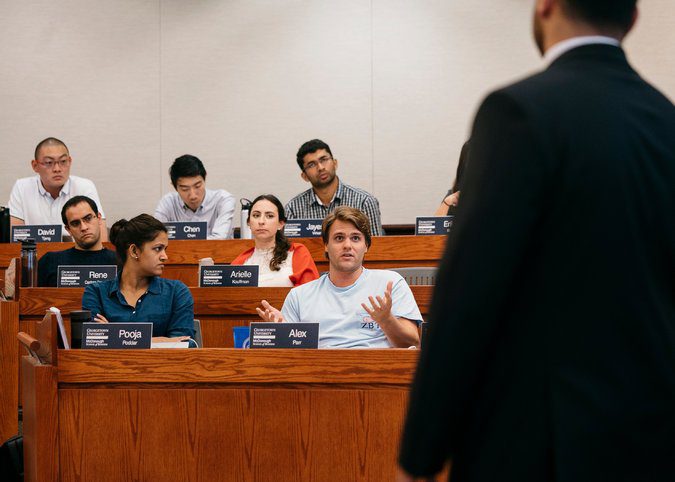Georgetown McDonough Entrepreneurs Win Big in Inaugural Pitch Contest

Last month, Georgetown University’s McDonough School of Business held its inaugural Leonsis Family Entrepreneurship Prize “Bark Tank” Pitch Competition, named in honor of the school’s mascot, the bulldog. Put together by a team of expert entrepreneurs at the Georgetown Entrepreneurship Initiative, the goal of the competition was to support students and alumni in their startup ventures. Overall, nearly a dozen teams and individuals competed for $100,000 in prize money.
In alignment with Georgetown’s Jesuit values, the pitch competition highlighted business ventures that focused on problems in the world around them. Ultimately, the prize money was intended to bring awareness to innovative technology and business ideas that address a social issue by doing good.
“It is wonderful to watch the community rally around ‘StartupNation,’” Ted Leonsis—the founder, majority owner, chairman, and CEO of Monumental Sports & Entertainment—said in a press release from the university. “It has been tremendous to watch these entrepreneurs exhibit passion to tackle these issues. Entrepreneurship allows Georgetown University to stand atop of what they are already doing, which is to develop the whole person. We have the opportunity to become an institution where people not only get an education but also have a higher calling.”
The ultimate winner of the “Bark Tank” pitch competition was Hatch, a startup launching soon in Washington DC, that seeks to provide co-working and child care solutions for working parents. Founded by J.P. Coakley (MBA ’18) and Kelsey Lents (MBA ’18), Hatch won $30,000 at the competition, which will enable it to open its first location.
The Leonsis Prize underscores the student experience at Georgetown University in how the student, faculty, and alumni communities continuously help each other through scholarship, mentorship, and networking,” said Lents. “This support has impressed and motivated us to launch our business. We are excited to have won the Leonsis Family Entrepreneurship Prize, which will be instrumental in helping us to secure the lease and letter of credit required to open the first location of Hatch.”
Other prize recipients included ClassPulse, a professional development tool that allows professors to collect student feedback in real time. Founded by Claudia Recchi (B ’17), ClassPulse won $25,000. The third-place prize went to Cusp 365, an app that helps college women live a more healthy life. Founded by Jaclyn DiGregorio (B ’17), it received $15,000. Another five ventures, Campus Sherpa, Edible Finance, Foublie, Galapagos Strategy, and Qoral Health, each won $5,000 in prize money.
Overall, the winners were chosen based on scores by a panel of judges including CEOs, founders, and chairmen from leading companies in the area.
To learn more, visit the website or watch the video from the contest below.
This article has been edited and republished with permissions from our sister site, Clear Admit.
Top Schools Tackle Sexual Harassment, NFL Protests, and More

Should business schools teach ethics and social responsibility? In the past, top MBA programs stuck to a fairly typical curriculum: finance, marketing, accounting, economics. And while those topics still comprise the core of most MBA programs, they’re now only a part of the whole.
Beyond allowing MBA students to focus their studies in areas like entrepreneurship or technology, MBA programs are also taking on some of the most prominent ethical topics of the day, asking students to weigh in on current headlines and happenings. It’s the MBA ethics debate.
According to a United Nations group survey of business school students from around the world, students believe that ethics are a business’s most important responsibility. According to the report, “the exposure to, and teaching of, business ethics does not merely assist business leaders to resolve moral dilemmas. More importantly, it matures their proficiency in moral judgment and their ability to incorporate social issues in the decision-making process and assists them in implementing this in an all-inclusive manner.”
For example, last year a group of business executives—including the CEO of PepsiCo and head of General Motors—got together to dissolve two business councils that consulted with President Trump after insensitive remarks about the white supremacist violence that took place in Charlottesville, VA. And other executives such as the CEO of Patagonia, Yvon Choinard, have been vocal about political and ethical issues—even using their companies to take positions on social responsibility that would typically be considered outside the scope of business.
So, it’s no wonder many business schools have been making business ethics a more important part of their curriculum. The question is, “How should business ethics be added to the MBA curriculum, and how is it being added currently?” It depends on the school.
At Georgetown University’s McDonough School of Business, Professor Edward Soule teaches courses on business ethics, corporate social responsibility, and leadership. During these classes, he told the New York Times that he has assigned coursework covering a range of trending topics including sexual harassment at Uber, social justice protests by N.F.L. players, and how companies like Amazon have responded when attacked by President Trump.
“Something has changed,” Soule said. “I would be kidding you if I told you there wasn’t a different vibe in the classroom. Ethics and values have taken on more significance. It has to do with all of the things going on in this administration, often things that challenge our understanding of ethics and leadership.”

Students discuss the recent NFL protests in Prof. Ed Soule’s class at Georgetown’s McDonough School of Business. Photo via Justin T. Gellerson for The New York Times.
Georgetown McDonough is also home to the Institute for the Study of Markets and Ethics (GISME), a center that examines the ethical issues inherent in the functioning of a market society. Students, faculty, and researchers who participate in the center explore ethical questions as they relate to business and bring ethical considerations to bear on policy decisions regarding the regulation of markets. These are especially salient issues for Georgetown McDonough given its Washington D.C. location.
“At the McDonough School of Business, we have developed a method of teaching business ethics that includes normative experiential learning, communicates in terms readily understood by business students, and involves actual ethical decision-making on the part of the students,” Michael Douma, assistant research professor and director of GISME, said in a news release. “We have found that our approach results in students being more invested in the course and more committed to resolving ethical issues that confront them in a business environment.”
Another example can be found at Carnegie Mellon’s Tepper School of Business. According to John Hooker, a professor of operations research and business ethics and social responsibility, ethics has been a part of the Tepper School curriculum since the 1990s. “Our program was apparently the first to introduce the topic (1966), as part of a course on business law,” Hooker told us. “The ethics presence has gradually increased over the years, but we ethics faculty often have to fight for it. My view is that a required ethics course should be part of the picture.”
And Leanne Meyer, co-director of the Accelerate Leadership Center at the school, told the New York Times, “There’s a turning point in what’s expected from business leaders. Up until now, business leaders were largely responsible for delivering products. Now, shareholders are looking to corporate leaders to make statements on what would traditionally have been social justice or moral issues.”
As for ethics and MBA students, Tepper’s core offering in Ethics and Leadership is one of the only second-year courses it requires its students to take. The course teaches students how to foster their ability to reason and how to handle the ethical implications of managing organizations and people.
“The basic lesson for MBA students is that business ethics is not optional,” explained Hooker. “It is the basis for the social infrastructure that makes business possible, much as engineering is the basis for physical infrastructure. It requires careful analysis and training, no less than engineering or finance. This is why we need a stand-alone ethics course. Business ethics training teaches us to do ethics with our brains rather than rely on gut feelings. Otherwise, we have no way to reach consensus on the ground rules.”
In the end, there are many options for MBA students interested in ethics, though ultimately it up to the students themselves to raise topics that are pressing to them. “Ethics courses often focus on the hot topics. This stimulates discussion and raises course ratings, but it generates more heat than light,” said Hooker. “I focus on issues that students themselves raise. I also emphasize cross-cultural ethics, because business is global, and norms vary enormously around in the world. U.S. students typically have little awareness of this.”
Whether through case studies, guest speakers, simulations, competitions, or another initiative, the leading MBA programs dive into business ethics and corporate responsibility using a range of approaches. To learn more about Professor Hooker’s approach to ethics, you can check out his blog: Ethical Decisions.
This article has been edited and republished from our sister site, Clear Admit
NBMBAA Announces Georegtown McDonough Partnership

Georgetown University’s McDonough School of Business has announced a new partnership with the National Black MBA Association (NBMBAA) as part of the first installment of the NBMBAA Collegiate Partnership Program. According to a press release, the program aims to increase awareness and facilitate access to graduate and business education programs in professional fields across the country. Continue reading…
McDonough Professor Douglas McCabe Honored With New Award

Georgetown Professor Douglas McCabe of the McDonough School of Business was recently honored with the “Best Paper Award” at the 2017 Annual Conference of the American Society for Competitiveness in Washington DC. This year’s conference theme was “Breaking Down Barriers to Competitiveness: A Path Forward.”
McCabe’s paper was titled “Conflict Resolution and Organizational Justice in the Workplace—The Evidence Based Research” and discussed current evidence-based research on how employees can achieve justice, equity, and voice within organizations.
“Conflict and its resolution play a critical role in organizations,” McCabe said. “A growing proportion of companies and corporations have turned to various dispute resolution procedures to resolve the complaints and grievances of their employees within the organizational behavior context.”
McCabe’s work has already become more than just research, having been put into practice at progressive firms. “Many of these quality and legitimate systems were put into place based upon the policy recommendations of my stream of research, as well as the research of other human resource management scholars,” he said.
This was the fourth Best Paper Award McCabe has earned during his career at Georgetown’s McDonough School of Business. The professor of management has worked at McDonough since 2013, teaching EMBA and management classes. Additional awards earned by McCabe include:
- Recipient of the Award for the Best Conceptual Research Paper at the Fourteenth Annual Conference of the American Society for Competitiveness
- Recipient of the Best Paper Award at the Fourth Annual World Business Congress of the International Management Development Association
- Recipient of the Best Professor Award of the inaugural class of the Executive Master’s in Leadership/District of Columbia Public School Principals at the McDonough School of Business
- Recipient of the Excellence in Education Award of the Labor and Employment Relations Association
- Twice Recipient of the Joseph F. LeMoine Award for Undergraduate and Graduate Teaching Excellence of the McDonough School of Business
- Twice the Recipient of the Outstanding Reviewer Award from the Emerald Literarti Network of the Emerald Group Publishing Limited. Additionally
- Recipient of the Certificate of Recognition from the National Office of The Phi Beta Kappa Society
McCabe earned his Ph.D. from Cornell University, his M.S. from Loyola University of Chicago, and his B.A. magna cum laude (Phi Beta Kappa) from Marquette University. Along with his written work in numerous academic refereed journal articles, papers, monographs, and speeches, he is also an active domestic and international management consultant.
The Secret To Finding An Affordable Washington DC MBA

Washington DC may be a top city for students pursuing their MBAs, but the city’s high cost of living could prove prohibitive for many young Mstudents. Growing rent prices over the past ten years have led DC to be one of the least affordable of the major U.S. metropolitan areas.
Of course, MBA students looking to apply their education to governmental agencies won’t find a better place to do so than in the nation’s capital. And though contending with high rent prices may be unavoidable, many business schools offer students a number of ways to keep the cost of their degree at a minimum.
From scholarships to grants and student work opportunities, business schools in Washington DC ensure that low-income applicants can have equal access to the high quality education their program’s provide. Below are just a few of the opportunities provided to assist low-income applicants at Washington DC MBA programs.
Finding An Affordable Washington DC MBA
McDonough School of Business – Georgetown University
Over $1.5 million in aid is available to MBA applicants through merit based scholarships at Georgetown University’s McDonough School of Business. All students are eligible for these grants, but it is advised to apply for the program early to best position yourself for consideration. International students in need of additional funding may also apply for external scholarships and private loans specifically for international students. The university has compiled a list of common lenders that students may want to consider here.
McDonough also provides scholarship opportunities through the Consortium, a group whose goal it is to reduce the under-representation of blacks, Native Americans, and Hispanic students in business education. As a member school, a number of scholarships are also available at McDonough for students admitted as part of the Consortium.
University of Maryland R.H. Smith School of Business
Roughly 85 percent of MBA students at UMD Smith receive merit based awards to help fund their education. Between scholarships, fellowships need-based awards and assistantship opportunities, students have a number of opportunities to reduce their tuition and keep their MBA affordable. Awards such as the Dean’s Award of Smith award provide two years and one-year of full scholarship and fees. Students may also find additional opportunities for scholarships through the university’s organizational partnerships, such as the Forté Foundation or management Leaders for Tomorrow.
YOU MAY ALSO LIKE: Georgetown McDonough Offers New FinTech Elective
George Mason University School of Business
The George Mason University School of Business provides one of the best values in education, demonstrated through the high success rate of alumni and the fact that Mason alumni have the lowest student loan default rates in Virginia.
Mason offers a number of financial aid opportunities through grants, scholarships, work-study employment, and loans. Every year, the school offers millions of dollars to incoming students, including fellowships for graduate students. The Office of Student Financial Aid is dedicated to assisting each student in finding the financial assistance that is needed for their degree.
George Washington University School of Business
The George Washington University School of Business offers a number of different ways for students to reduce the cost of their MBA degree. Each year, graduate students may apply to a number of different fellowships, available through the university as well as private foundations and agencies. At the Office of Graduate Student Assistantships & Fellowships, students can search through these numerous opportunities and see which scholarships best fit their qualifications.
GWU also offers Financial Aid based on the need of each students. Eligible applicants can apply for need-based aid by filing the Free Application for Federal Student Aid (FAFSA).
Howard University School of Business
MBA students at the Howard University School of Business may be eligible both for federal student aid, based on need, and a variety of scholarships, which are given based on merit and other factors. Scholarships range, and may cover up to full-tuition, while others provide partial funding. Howard MBA students may also pursue loans for tuition through the ACCESS Loan Program, Alternative Education Loans, or other private loan services.
Kogod School of Business – American University
The Kogod School of Business at American University ensures that its high quality education can be affordable for all. Roughly 80 percent of all students receive financial aid of some kind, with almost $85 million awarded just to the undergraduate population. Kogod offers both need-based aid and merit scholarships. Students may contact the Graduate Admission Office at Kogod for more information on the scholarships available to them, but all applicants who demonstrate excellent academic credentials will be considered for these honors—a separate application process is not needed.
Georgetown Launching Leadership Fellows Program This Winter

Georgetown University has announced a Leadership Fellows program for students enrolled in the McDonough School of Business’ full-time MBA program. Open to second-year MBAs, the new program will launch in January 2018.
The fellowship’s first cohort is made up of 26 students and takes place over the course of two modules: a coursework module and then a leadership module. Each student must take the Coaching High Performance Teams and Advanced Coaching for Leadership Fellows classes before coaching teams of first-year MBA students through their required Leadership Communications course, and the Executive Challenge final exam.
While coaching their fellow business students, fellows will receive guidance from executive coaches to advance their skills and develop their own expertise. Among these educators and executives is Evelyn Williams, the McDonough Professor of Management and program leader.
“The program encapsulates the Jesuit principles of leadership and service to others. Fellows will be responsible for the development and maximizing the learning of their first-year student teams,” Williams said.
“Think of it as infusing the culture with 26 highly trained executive coaches, and they’re now going to be let loose,” she said. “The sky’s the limit in terms of the impact they’ll have.”
Erin McDowell Morton (MBA’18) is among the students accepted in the fellowship’s inaugural class. Morton is excited to work together with others who are also interested in giving back to the McDonough community.
“The structure allows us to practice the concepts we’re learning in class and build leadership skills that will make us better employees, managers, and members of the community,” Morton said.
McDonough’s full-time MBA is a 21-month, daytime program with one intake of students each year, and the fall semester begins in August. Along with fellowship opportunities like this, students are given the opportunity to participate in four residencies and study abroad opportunities.
Find out who the rest of the McDonough Leadership Fellows are here.
